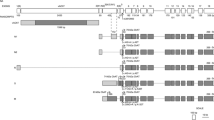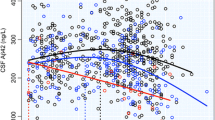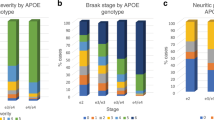Abstract
Alzheimer’s disease (AD) is characterized by a significant reduction in AcetylCholinesterase and an increase in ButyrylCholinesterase (BuChE) activity. The existence of polymorphic regions on the BuChE gene has been previously described; the most frequently found polymorphism is the so-called K variant, which leads to a 30% decreased enzymatic activity. Different studies reported a positive association between K variant and AD, strongest among late-onset AD and Apolipoprotein E (APOE) e4 carriers. We analyzed APOE and BuChE polymorphisms in 167 AD and 59 fronto-temporal dementia (FTD) patients compared with 129 healthy controls (HC). We reported a significantly lower frequency of the BuChE K variant in AD compared with HC and FTD and a significant increased frequency of the K variant in FTD. These results are in agreement with the known increase of the BuChE activity in AD and support the evidence of different molecular pathways involved in the pathogenesis of AD and FTD.
Similar content being viewed by others
References
Alvarez A, Opazo C, Alarcón R, Garrido J, Inestrosa NC (1997) Acetylcholinesterase promotes the aggregation of amyloid-beta-peptide fragments by forming a complex with the growing fibrils. J Mol Biol 272:348–361
Alvarez-Arcaya A, Combarros O, Llorca J, Sánchez-Guerra M, Berciano J, Fernández-Viadero C, Peña N (2000) The butyrylcholinesterase K variant is a protective factor for sporadic Alzheimer’s disease in women. Acta Neurol Scand 102:350–353
Ballard C, Morris C, Kalaria R, McKeith I, Perry R, Perry E (2005) The K variant of the butyrylcholinesterase gene is associated with reduced phosphorylation of tau in dementia patients. Dement Geriatr Cogn Disord 19:357–360
Bartels CF, Jensen FS, Lockridge O, van der Spek AF, Rubinstein HM, Lubrano T, La Du BN (1992) DNA mutation associated with the human butyrylcholinesterase K-variant and its linkage to the atypical variant mutation and other polymorphic sites. Am J Hum Genet 50:1086–1103
Blacker D, Haines JL, Rodes L, Terwedow H, Go RC, Harrell LE, Perry RT, Bassett SS, Chase G, Meyers D, Albert MS, Tanzi R (1997) ApoE-4 and age at onset of Alzheimer’s disease: the NIMH genetics initiative. Neurology 48:139–147
Blesa R, Bullock R, He Y, Bergman H, Gambina G, Meyer J, Rapatz G, Nagel J, Lane R (2006) Effect of butyrylcholinesterase genotype on the response to rivastigmine or donepezil in younger patients with Alzheimer’s disease. Pharmacogenet Genomics 16:771–774
Combarros O, Riancho JA, Arozamena J, Mateo I, Llorca J, Infante J, Sánchez-Juan P, Zarrabeitia MT, Berciano J (2007) Interaction between estrogen receptor-alpha and butyrylcholinesterase genes modulates Alzheimer’s disease risk. J Neurol 254:1290–1292
Darreh-Shori T, Brimijoin S, Kadir A, Almkvist O, Nordberg A (2006) Differential CSF butyrylcholinesterase levels in Alzheimer’s disease patients with the ApoE epsilon4 allele, in relation to cognitive function and cerebral glucose metabolism. Neurobiol Dis 24:326–333
Darreh-Shori T, Modiri N, Blennow K, Baza S, Kamil C, Ahmed H, Andreasen N, Nordberg A (2009) The apolipoprotein E varepsilon4 allele plays pathological roles in AD through high protein expression and interaction with butyrylcholinesterase. Neurobiol Aging (epub ahead of print)
Darvesh S, Hopkins DA (2003) Differential distribution of butyrylcholinesterase and acetylcholinesterase in the human talamus. J Comp Neurol 463:25–43
Déniz-Naranjo MC, Muñoz-Fernández C, Alemany-Rodríguez MJ, del Carmen Pérez-Vieitez M, Aladro-Benito Y, Irurita-Latasa J, Sánchez-García F (2007) Butyrylcholinesterase. ApoE and Alzheimer’s disease in a population from the Canary Islands (Spain). Neurosci Lett 427:34–38
Diamant S, Podoly E, Friedler A, Ligumsky H, Livnah O, Soreq H (2006) Butyrylcholinesterase attenuates amyloid fibril formation in vitro. Proc Natl Acad Sci USA 103:8628–8633
Duara R, Barker WW, Lopez-Alberola R, Loewenstein DA, Grau LB, Gilchrist D, Sevush S, St George-Hyslop S (1996) Alzheimer’s disease: interaction of apolipoprotein E genotype, family history of dementia, gender, education, ethnicity, and age of onset. Neurology 46:1575–1579
Geula C, Mesulam M-M (1989) Cortical cholinergic fibres in aging and Alzheimer’s Disease: a morphometric study. Neuroscience 33:469–481
Ghebremedhin E, Thal DR, Schultz C, Braak H (2002) Age-dependent association between butyrylcholinesterase K-variant and Alzheimer Disease-related neuropathology in human brains. Neurosci Lett 320:25–28
Gómez-Ramos P, Bouras C, Morán MA (1994) Ultrastructural localization of butyrylcholinesterase on neurofibrillary degeneration sites in the brains of aged and Alzheimer’s disease patients. Brain Res 640:17–24
Grubber JM, Saunders AM, Crane-Gatherum AR, Scott WK, Martin ER, Haynes CS, Conneally PM, Small GW, Roses AD, Haines JL, Pericak-Vance MA (1999) Analysis of association between Alzheimer disease and the K variant of butyrylcholinesterase (BCHE-K). Neurosci Lett 269:115–119
Hiltunen M, Mannermaa A, Helisalmi S, Koivisto A, Lehtovirta M, Ryynanen P Sr, Soininen H (1998) Butyrylcholinesterase K variant and apolipoprotein E4 genes do not act in synergy in Finnish late-onset Alzheimer’s disease patients. Neurosci Lett 250:69–71
Holmes C, Ballard C, Lehmann D, David Smith A, Beaumont H, Day IN, NadeemKhan M, Lovestone S, McCulley M, Morris CM, Munoz DG, O’Brien K, Russ C, Del Ser T, Warden D (2005) Rate of progression of cognitive decline in Alzheimer’s disease: effect of butyrylcholinesterase K gene variation. J Neurol Neurosurg Psychiatry 76:640–643
Huey ED, Putnam KT, Grafman J (2006) A systematic review of neurotransmitter deficits and treatments in frontotemporal dementia. Neurology 66:17–22
Jensen FS, Nielsen LR, Schwartz M (1996) Detection of the plasma cholinesterase K variant by PCR using an amplification-created restriction site. Hum Hered 46:26–31
Ki CS, Na DL, Kim JW, Kim HJ, Kim DK, Yoon BK (1999) No association between the genes for butyrylcholinesterase K variant and apolipoprotein E4 in late-onset Alzheimer’s Disease. Am J Med Genet 88:113–115
Kim KW, Jhoo JH, Lee JH, Lee KU, Lee DY, Youn JC, Youn JY, Woo JI (2001) Neither the butyrylcholinesterase K variant nor transferrin C2 variant confers a risk for Alzheimer’s Disease in Koreans. J Neural Transm 108:1159–1166
Lee DW, Liu HC, Chi CW, Hong CJ (2000) No association between butyrylcholinesterase K-variant and Alzheimer Disease in Chinese. Am J Med Genet 96:167–169
Lehmann DJ, Johnston C, Smith AD (1997) Synergy between the genes for butyrylcholinesterase K variant and apolipoprotein E4 in late-onset confirmed Alzheimer’s Disease. Hum Mol Genet 6:1933–1936
Maetzler W, Keller S, Michelis J, Koehler N, Stransky E, Becker C, Schulte C, Melms A, Gasser T, Berg D (2009) No differences of butyrylcholinesterase protein activity and allele frequency in Lewy body diseases. Neurobiol Dis 35:296–301
Mateo I, Llorca J, Infante J, Rodríguez-Rodríguez E, Berciano J, Combarros O (2008) Gene-gene interaction between 14-3-3 zeta and butyrylcholinesterase modulates Alzheimer’s disease risk. Eur J Neurol 15:219–222
McIlroy SP, Crawford VL, Dynan KB, McGleenon BM, Vahidassr MD, Lawson JT, Passmore AP (2000) Butyrylcholinesterase K variant is genetically associated with late onset Alzheimer’s disease in Northern Ireland. J Med Genet 37:182–185
McKeith IG, O’Brien KK, Morris CM, Perry EK (2003) Butyrylcholinesterase and dementia with Lewy bodies: involvement in symptom progression and treatment response. In: Giacobini E (ed) Butyrylcholinesterase: its function and inhibitors. Martin Dunitz, London, pp 149–162
McKhann G, Drachman D, Folstein M, Katzman R, Price D, Stadlan EM (1984) Clinical Diagnosis of Alzheimer’s Disease: Report of the NINCDS-ADRDA Work Group under the auspices of Department of health and Human Services Task Force on Alzheimer’s Disease. Neurology 34:939–944
Mesulam M, Geula C (1994) Butyrylcholinesterase reactivity differentiates the amyloid plaques of aging from those of dementia. Ann Neurol 36:722–727
Mullenbach R, Lagoda PJ, Welter C (1989) An efficient salt-chloroform extraction of DNA from blood and tissues. Trends Genet 5:391
Neary D, Snowden JS, Northern B, Goulding P (1988) Dementia of frontal lobe type. J Neurol Neurosurg Psychiatry 51:353–361
O’Brien KK, Saxby BK, Ballard CG, Grace J, Harrington F, Ford GA, O’Brien JT, Swan AG, Fairbairn AF, Wesnes K, del Ser T, Edwardson JA, Morris CM, McKeith IG (2003) Regulation of attention and response to therapy in dementia by butyrylcholinesterase. Pharmacogenetics 13:231–239
Panegyres PK, Mamotte CD, Vasikaran SD, Wilton S, Fabian V, Kakulas BA (1999) Butyrycholinesterase K variant and Alzheimer’s disease. J Neurol 246:369–370
Perry EK, Perry RH, Blessed G, Tomlinson BE (1978) Changes in brain cholinesterases in senile dementia of Alzheimer type. Neuropathol Appl Neurobiol 4:273–277
Piccardi M, Congiu D, Squassina A, Manconi F, Putzu FP, Mereu RM, Chillotti C, Del Zompo M (2007) Alzheimer disease: Case-control association study of polymorphisms in ACHE, CHAT, and BCHE genes in a Sardinian sample. Am J Med Genet 144B:895–899
Podoly E, Bruck T, Diamant S, Melamed-Book N, Weiss A, Huang Y, Livnah O, Langermann S, Wilgus H, Soreq H (2008) Human recombinant butyrylcholinesterase purified from the milk of transgenic goats interacts with beta-amyloid fibrils and suppresses their formation in vitro. Neurodegener Dis 5:232–236
Podoly E, Shalev DE, Shenhar-Tsarfaty S, Bennett ER, Ben Assayag E, Wilgus H, Livnah O, Soreq H (2009) The butyrylcholinesterase K variant confers structurally derived risks for Alzheimer pathology. J Biol Chem 284:17170–17179
Raygani AV, Zahrai M, Soltanzadeh A, Doosti M, Javadi E, Pourmotabbed T (2004) Analysis of association between Butyrylcholinesterase K variant and apolipoprotein E genotypes in Alzheimer’s Disease. Neurosci Lett 371:142–146
Scacchi R, De Bernardini L, Mantuano E, Donini LM, Vilardo T, Corbo RM (1995) Apolipoprotein E (APOE) allele frequencies in late-onset sporadic Alzheimer’s disease (AD), mixed dementia and vascular dementia: lack of association of epsilon 4 allele with AD in Italian octogenarian patients. Neurosci Lett 201:231–234
Scacchi R, Gambina G, Moretto G, Corbo RM (2008) Variability of AChE, BChE, and ChAT genes in the late-onset form of Alzheimer’s disease and relationships with response to treatment with Donepezil and Rivastigmine. Am J Med Genet B Neuropsychiatr Genet 150B:502–507
Singleton AB, Smith G, Gibson AM, Woodward R, Perry RH, Ince PG, Edwardson JA, Morris CM (1998) No association between the K variant of the butyrylcholinesterase gene and pathologically confirmed Alzheimer’s Disease. Hum Mol Genet 7:937–939
Sodeyama N, Yamada M, Itoh Y, Otomo E, Suematsu N, Matsushita M (1999) Association between butyrylcholinesterase K variant and the Alzheimer type neuropathological changes in apolipoprotein E epsilon4 carriers older than 75 years. J Neurol Neurosurg Psychiatry 67:693–694
Tilley L, Morgan K, Grainger J, Marsters P, Morgan L, Lowe J, Xuereb J, Wischik C, Harrington C, Kalsheker N (1999) Evaluation of polymorphisms in the presenilin-1 gene and the butyrylcholinesterase gene as risk factors in sporadic Alzheimer’s disease. Eur J Hum Genet 7:659–663
Whenam PR, Price WH, Blandell G (1991) Apolipoprotein E genotyping by one-stage PCR. Lancet 337:1158–1159
Wiebusch H, Poirier J, Sévigny P, Schappert K (1999) Further evidence for a synergistic association between APOE e4 and BCHE-K in confirmed Alzheimer’s Disease. Human Genet 104:158–163
Yamamoto Y, Yasuda M, Mori E, Maeda K (1999) Failure to confirm a synergistic effect between the K-variant of the butyrylcholinesterase gene and the e4 allele of the apolipoprotein gene in Japanese patients with Alzheimer’s Disease. J Neurol Neurosurg Psychiatry 67:94–96
Acknowledgment
This work was partially supported by the Italian Ministry of Education University and Research (MIUR), grant no. 70200058 to C. Masullo
Conflict of interest statement
None.
Author information
Authors and Affiliations
Corresponding author
Rights and permissions
About this article
Cite this article
Bizzarro, A., Guglielmi, V., Lomastro, R. et al. BuChE K variant is decreased in Alzheimer’s disease not in fronto-temporal dementia. J Neural Transm 117, 377–383 (2010). https://doi.org/10.1007/s00702-009-0358-y
Received:
Accepted:
Published:
Issue Date:
DOI: https://doi.org/10.1007/s00702-009-0358-y




